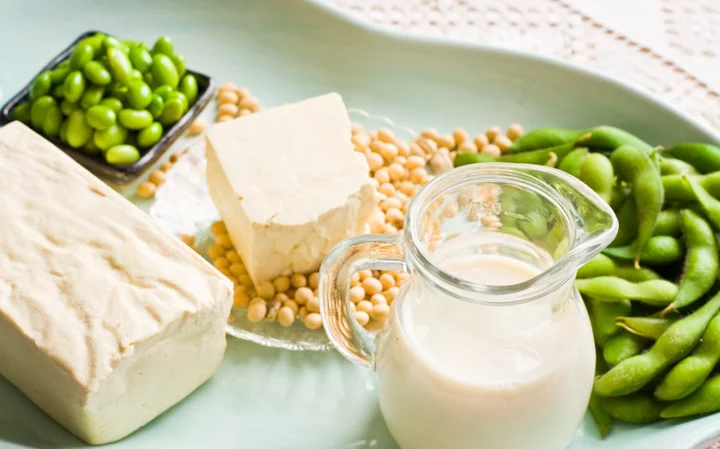
Russia's Luna-25 spacecraft enters lunar orbit -space agency
MOSCOW Russia's lunar spacecraft entered the moon's orbit on Wednesday, a major step towards the country's ambition of
1970-01-01 08:00

Half of anxiety and depression cases in new and expectant mums are missed: 7 signs a new mum needs help
Half of all anxiety and depression cases among new and expectant mothers are going undiagnosed, according to a new report. Although 10-20% of women develop mental health problems, which can include anxiety and depression, during pregnancy or within the first year after having a baby, 50% of cases are being missed – despite contact with professionals, the report by the Royal College of Midwives (RCM) found. The report suggested that mental health needs are still secondary to physical health during pregnancy, and has called for a boost in midwife numbers to help spot more cases of mental ill health. Amanda Mansfield, professional advisor to the RCM and one of the lead authors of the report, said the 20% of new or expectant mothers who have mental health issues will experience a range of symptoms. “Often the ‘baby blues’ is normalised because it’s something lots of people get, and women are told, ‘You’ll be fine’,” Mansfield told PA Media. “That can contribute to the fact that significant numbers of women downplay their symptoms – in some reports, up to 70% of women don’t feel able to disclose how they feel, they may feel judged. “Some women feel it may affect their ability to mother, or they may be concerned their baby may be taken away.” Mansfield added that some women may feel unable to share their symptoms with a health professional, because they’re worried about how they’re going to be perceived. “But it really is ok to not be ok, rather than women playing down and diluting their feelings,” she added. It’s a good idea for everyone to be aware of mental health risks during pregnancy and beyond. Here are seven signs that somebody might need mental health support, and how to talk about it… 1. DepressionPregnant women or new mums may feel low, unhappy and tearful for much or all of the time. Mansfield said: “It’s looking for the variation in normal patterns of behaviour. Family and friends should ask, in a very compassionate, non-judgmental way, how the woman’s feeling.” If friends and family don’t feel confident about having such conversations, they should encourage the woman to talk to her health professional, Mansfield added. 2. Anxiety Feelings of anxiety can manifest in many ways, and physical symptoms can include a racing pulse, breathlessness and sweating. But whether there are physical symptoms or not, it’s vital for women to talk about how they’re feeling, said Mansfield. “A woman may say she feels particularly anxious about the birth, or relatives coming over, or the in-laws, and having the space to talk about it is really important, to share the anxiety with a midwife that she has a relationship with.” If these anxious feelings don’t improve over time, Mansfield said they can be referred to a specialist midwife who’s an expert in perinatal mental health, and who may be able to offer additional interventions and support. 3. Altered sleep patterns All new parents will of course find their sleep is affected, but if there is also an underlying mental health issue going on, exhausted women may find it even hard to fall or stay asleep. “Women may have significantly disrupted sleep patterns, but we often normalise that with later pregnancy and new parents having difficulty sleeping,” Mansfield pointed out. “It’s really important that if you’re having problems sleeping, and you may be unable to settle and find your mood is a lot lower, you talk to your health professional about that.” 4. Appetite changes “Some people do find their appetite is affected,” said Mansfield. This may mean women lose their appetite and forget to eat or, conversely, comfort eat and possibly put weight on. 5. Difficulty concentrating It’s common for women to describe having ‘brain fog’ when they’re pregnant or have just had a baby, but sometimes an inability to concentrate can be a sign of a deeper problem. Mansfield explained: “A woman’s ability to concentrate can be markedly affected, and we often downplay that – it can be a subtlety that we ally with having a baby or being pregnant, but these can be really important signs and symptoms to share with your health professional, as they may suggest there’s something that needs exploring further.” 6. Obsessive compulsive behaviour Starting to behave obsessively or compulsively, or symptoms of any pre-existing obsessive compulsive disorder (OCD) getting worse, can be linked to perinatal mental ill health too. “Some women may be excessively tidying, for example, or be fixated on something and they may become more anxious,” said Mansfield. “Very commonly, obsessive compulsive disorder may become worsened. Certainly if someone does have compulsive disorders, it’s important not to put them to one side, but share them with your midwife. Picking it up early is so important.” 7. Unusual thoughts Of course, new parents will have lots of new things to think about – but when those thoughts are perhaps a little unusual, it’s worth talking to family, friends and your midwife or health visitor about them. Mansfield said: “Women may present with different thoughts they haven’t experienced before, and often they downplay that because they’re not sure whether they’re normal or not, or they might think they’re just part of being pregnant and having a baby. “The challenge for us as midwives is when you only have 15/20 minutes antenatally to do the whole health assessment – the physical and mental health assessment. It’s about understanding the subtlety of behaviour change.” Read More Charity boss speaks out over ‘traumatic’ encounter with royal aide Ukraine war’s heaviest fight rages in east - follow live This Morning’s Dr Zoe Williams: Why gut health could be more important than you think this summer Vitamin D intake ‘may reduce cancer mortality in the population by 15%’ – study Men who cycle, jog or swim could cut risk of nine cancers – study
1970-01-01 08:00

AI has created celebrity Mortal Kombat and Street Fighter games and they look amazing
2023 has so far been the year of artificial intelligence and although not all of its uses have been welcome it does appear to have come up with one good thing: celebrity fighting games. In the past few days, AI creations of two of the most popular beat-up franchises, Mortal Kombat and Street Fighter have emerged on social media. However, rather than feature classic characters like Ryu, Ken, Chun-Li, Scorpion, Sub-Zero and Raiden these iterations feature exaggerated versions of famous faces from the real world. The first of these that went viral was Celebrity Mortal Kombat which was shared by the actual creator of the original game Ed Boon but was created by the YouTube channel Interdimensional TV. The celebrity version features: Joe Biden, Beyonce, Elvis Presley, Pope Francis, Angela Merkel, Donald Trump, LeBron James, Mark Zuckerberg, Kanye West, Xi Jinping, Oprah Winfrey, Albert Einstein, Kim Jung-Un, Jackie Chan, Hillary Clinton, Vladimir Putin, Elon Musk, Jeff Bezos, Stephen Hawking, Mother Teresa, Snoop Dogg, Shaquille O'Neill, Rihanna, William Shakespeare, Marilyn Monroe, George Washington, Gordon Ramsay, Ruth Bader Ginsberg, Barack Obama, Tom Cruise, Keanu Reeves, Queen Elizabeth II, Marie Curie, Taylor Swift, Mahatma Gandhi, The Rock and J Robert Oppenheimer. If that wasn't enough a Celebrity Mortal Kombat II video has also been made with an updated roster that Boon also shared. This one stars Will Smith, Greta Thunberg, Winston Churchill, Freddie Mercury, David Bowie, Steve Irwin, Mike Tyson, Nicki Minaj, Jimi Hendrix, Steve Jobs, Lionel Messi, Richard Nixon, Narendra Modi, Lizzo, Mr Rogers, Emma Watson, Kim Kardashian, Ellen Degeneres, Sylvester Stallone, Cardi B, Hunter Biden, Arnold Schwarzenegger, Volodymyr Zelensky, Ice Cube, Usain Bolt, Mozart, Nicolas Cage, Katy Perry, Michael Jackson, Bruce Lee, Joe Rogan, Notorious B.I.G, PewDiePie, Leonardo DaVinci, Chris Pratt, Margaret Thatcher, Frida Khalo, Mitch McConnell, Tesla, Justin Trudeau, Manny Pacquiao, Josef Stalin, Morgan Freeman and Chuck Norris. However, if you are more of a Street Fighter player then fear not as your interests have also been catered for. Many of the same faces from the Mortal Kombat game reappear but there are a few new characters such as Peter Dinklage, Miley Cyrus, Chris Farley and Johnny Depp. Sadly it doesn't look like we'll get to play these games anytime soon but we'll be first in line at the arcade should they become available. Sign up to our free Indy100 weekly newsletter Have your say in our news democracy. Click the upvote icon at the top of the page to help raise this article through the indy100 rankings.
1970-01-01 08:00

Banking glitch allows customers to withdraw money they don't have
A technical fault meant that for several hours Tuesday customers of one of Ireland's biggest banks could withdraw funds they did not have.
1970-01-01 08:00

Instagram users are not happy with new likes feature
From Twitter being rebranded as X, to Meta who have rivalled this with their new Threads platform, there's been quite a few changes to social media this year. One of those recent changes also includes Instagram’s new-like animation which applies to those who updated the app. It means that when you like something on Instagram, the large heart will then appear in the area where you double-tapped on the photo and then the heart flies upwards off the screen. Of course, when it comes to social media updates, no one is a fan of change and Instagram users made this clear on X, formerly known as Twitter. Here is a compilation of reactions who all shared they weren't happy with the new like update, as one declared the feature "sucks," though this update did result in some amusing memes too: Unfortunately for those who updated the app, there is no way to change the like option back to the original but those who haven't updated Instagram can avoid the new feature if they opt out of auto-updates on Instagram. Sign up to our free Indy100 weekly newsletter Have your say in our news democracy. Click the upvote icon at the top of the page to help raise this article through the indy100 rankings.
1970-01-01 08:00

China Evergrande to delay creditors' meetings amid fresh restructuring plan
Embattled property developer China Evergrande Group on Wednesday resolved to delay its meetings for the Hong Kong CEG
1970-01-01 08:00

Thai lawmakers to vote on PM next week in bid to end deadlock
By Chayut Setboonsarng and Panarat Thepgumpanat BANGKOK (Reuters) -Thai lawmakers will vote for a new premier next week, the house
1970-01-01 08:00

Hollywood has misunderstood Barbie success, says Randall Park
Hollywood has misunderstood the success of 'Barbie', according Randall Park.
1970-01-01 08:00

Bindeshwar Pathak: India's 'Toilet Man' who made urinating safely a reality
India is mourning campaigner and social reformer Bindeshwar Pathak who died on Tuesday, aged 80.
1970-01-01 08:00

This Morning’s Dr Zoe Williams: Why gut health could be more important than you think this summer
We tend to be more aware of aspects of our health that we can see – but your gut, and how you look after it this summer, could have a bigger impact than you think. “Although we can’t see our gut, it does influence the way that our bodies look on the outside as well,” said GP Dr Zoe Williams, one of the resident doctors on ITV’s This Morning. The health of our gut isn’t just about digestion, either. It’s closely linked to just about every system in the body, including skin, immunity, mood, and weight management, Williams explained. Signs of poor gut health can include bloating, diarrhoea, constipation, abdominal discomfort. However there maybe less obvious signs too, Williams noted, such as general fatigue, feeling sluggish, low or lacking in energy, or your skin feeling unhealthy. According to new research by Activia, 82% of Brits agree it’s important to look after gut health, but nearly a half (47%) don’t know where to start. There’s growing evidence around the links between general health and the gut, and experts believe getting good sleep and regular exercise play a part. But, what else do you need to know? Gut health, weight and diet “Gut microbiome – the community of largely bacteria but also other microbes, like viruses, fungi, parasites that live in our gut – produce chemical signals which communicate with our brain and other parts of our body, and actually can send hunger signals as well,” said Williams, 43. “The make up of that microbiome can even influence hunger and food choices. “If we feed our gut microbiome well – with a diet that’s high in fibre with a diverse range of different types of plant fibres, including as many different varieties of fruits, vegetables, whole grains, nuts, seeds and legumes as possible – those ‘gut bugs’ actually ferment fibre on our behalf, because humans can’t digest certain types of fibre.” Gut health and stress In our modern lives, we tend to have micro-doses of stress many times throughout the day, every day, Williams noted: “And as human beings, we’re not adapted to deal with that very well”. She using breathing techniques to stay calm during her work as a GP. “When we’re in that calm side of our nervous system (the parasympathetic), our body is better able to digest our food. Breathing exercises are something people can do multiple times a day. And it’s something I do between patients actually, I often do box breathing.” With this method, you breathe in for four counts, hold your breath for four counts, exhale for four counts, and then hold after your exhale for another four counts. It’s a two-way street when it comes to stress and the gut – and improving your diet can also help with stress. “The gut and the brain are physically connected by a nerve called the vagus nerve, [which] sends chemical messages to each other,” Williams added. “By making changes to improve your diet in order to try and support your gut microbiome, that in itself can actually also have an impact on on stress.” Summer travel can play havoc When it comes to travel, Williams said: “Some people are more affected than others, but it can really upset the gut.” From different time zones and foods, to having more alcohol and the effects of flying, it’s no surprise if you get more gut symptoms abroad. “I’m absolutely not the sort of person to say, ‘Don’t have a glass of wine or don’t have those extra croissants’, but you can try and combat it but making sure you’re really well hydrated and making sure you’re still getting in lots of fruit and vegetables,” Williams added. And if you’re travelling to a different time zone? “Try and get onto that time zone earlier. Sometimes people stay on a UK time until their second day, but if you can start living life according to the time zone you’re travelling to before you set off, your gut is more likely to adapt to that.” The power of a good diet Guts are creatures of habit, so while you may want to overhaul your diet, it’s a good idea to make changes gradually. “They don’t really like things to change too quickly, and they thrive when we have a very regular eating pattern and a good window of fasting, so it’s best to try not eat for at least two hours, ideally three hours before you go to bed at night,” suggested Williams. The main way to improve gut health is increasing dietary fibre intake – with a focus on variety. “We should be able to get 30 grams of fibre a day, and less than 10% of us actually manage that,” said Williams. “If you do it regularly, it can make a huge difference”. Switch up everyday staples – like white rice for brown rice, or kidney beans for mixed beans. “Include probiotics in your diet, yoghurts and kombucha, kimchi, sauerkraut, certain types of cheeses… you can use kombucha to make a salad dressing,” she added. “In summer, with the warmer weather, berries can really support your gut health. I love to eat berries in the summer.” Hydration also plays a part Williams continued: “If you’re eating lots of fibre and all the right types of foods, and you’re putting some probiotic foods in there, your body requires enough water to do the mechanical action of breaking it all down, and then to help it travel through the gut in the way that it should. “If you’re putting all that effort into your nutrition and exercising and sleeping and you just don’t have enough water, then you might not be getting the full benefit,” she warned. “Any drinks that are non-alcoholic count towards your fluid for the day, but watch out for sugar and artificial sweeteners.” Most people need between one-and-a-half to two litres of fluid a day to stay hydrated, but in hot weather or if you’re very active, then you may need more, Williams noted. Women can be more prone to gut issues “What we see clinically is that a lot of [gut] symptoms tend to affect women more,” explained Williams. There’s no definite answer as to why, but women have fluctuating hormones, which she says can cause gut symptoms too. Prostaglandins, the hormone that causes the womb to contract before menstruation, can make your bowel contract as well. “A lot of women get looser, diarrhoea or some discomfort the week before the period.” In addition, the postnatal crash after high oestrogen levels during pregnancy can impact gut health. “When you’ve had a baby, trying to have any form of routine yourself in that first few months, eating regularly and sleeping regularly is practically impossible,” Williams added. “The postnatal period is a really important time for people around the mother to ensure that she is well-nourished with really good quality food, and given time by other people to get the time she needs to rest as well.” Dr Zoe Williams is working with Activia to coach people on the A-Z of gut health and raising awareness of the gut as fundamental to your overall health. Read More Charity boss speaks out over ‘traumatic’ encounter with royal aide Ukraine war’s heaviest fight rages in east - follow live Holly Willoughby’s Wylde Moon website has started an important conversation about ‘orgasm anxiety’ – here’s why it matters Vitamin D intake ‘may reduce cancer mortality in the population by 15%’ – study Men who cycle, jog or swim could cut risk of nine cancers – study
1970-01-01 08:00

Vegan diet can reduce hot flashes associated with menopause, study suggests
Plant-based diets with a sufficient amount of soy can reduce hot flashes while also aiding weight loss, according to the Women’s Study for the Alleviation of Vasomotor Symptoms (WAVS) trial. A study published by the North American Menopause Society in the journal Menopause found that a diet intervention is about as effective as hormone replacement therapy for reducing menopausal hot flashes, without the associated health risks. “We do not fully understand yet why this combination works but it seems that these three elements are key—avoiding animal products, reducing fat, and adding a serving of soybeans,” explained lead researcher Neal Barnard, MD, president of the Physicians Committee and adjunct professor at the George Washington University School of Medicine. “Our results mirror the diets of places in the world, like pre-Westernized Japan and modern-day Yucatán Peninsula, where a low-fat, plant-based diet including soybeans is more prevalent and where postmenopausal women experience fewer symptoms.” To conduct the study, researchers recruited 84 postmenopausal women that reported episodes of hot flashes two or more times per day. Participants were randomly assigned into two groups. One group was an intervention group that was on a low-fat vegan diet consuming half a cup of cooked soybeans daily, while the other was a control group with no dietary changes for 12 weeks. After 12 weeks, researchers found that those on a vegan diet had a 88 per cent decrease in moderate to severe hot flashes and had lost an average of eight pounds. This is about the same success rate as hormone replacement therapy (HRT), which is usually 70 to 90 per cent effective against hot flashes. The trial was split into two parts, the first being published in 2021 and the second being published this year. It successfully addressed the point that there may be positive changes seen in menopause relief due to seasonal temperature variations. The first trial, which was conducted during the autumn season raised the question of whether this symptomatic improvement might have been attributed to cooler temperatures. But women who began the study as the weather warmed up in the spring had the same benefit, ruling out the effect of the temperature outside. “These new results suggest that a diet change should be considered as a first-line treatment for troublesome vasomotor symptoms, including night sweats and hot flashes,” explains Dr Barnard. Dr Barnard and the team agree said their results not only support putting diet and lifestyle at the forefront of the conversation with hot flash relief during menopause but also for other common complications such as weight gain and chronic disease implications. “This study demonstrates the effectiveness of a dietary intervention for menopausal symptoms,” Dr Barnard said. “As well, it is precisely the diet that would be expected to reduce the health concerns of many women reaching menopause: an increasing risk of heart disease, breast cancer, and memory problems.” The findings are published in the journal Menopause. Read More What are the symptoms of menopause and how can they be relieved? What’s the link between the menopause and anxiety? Menopause affecting your mental health? Experts reveal what to do What I gained (and lost) by walking 10,000 steps each day for 5 months Raven-Symoné details cosmetic surgeries she had before she turned 18 Nearly half of US adults are interested in taking weight loss prescription drugs
1970-01-01 08:00

Supergroup Mantra of The Cosmos share latest single
Mantra of The Cosmos performed the track at Glastonbury in June.
1970-01-01 08:00
